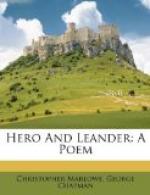|
This section contains 4,929 words (approx. 17 pages at 300 words per page) |

|
SOURCE: Fraser, Russell A. “The Art of Hero and Leander.” The Journal of English and Germanic Philology 57, no. 4 (October 1958): 743-54.
In the following essay, Fraser finds fantastical conceits and traces of humor in Hero and Leander.
No one has ever challenged Marlowe's greatness as a maker, his mastery of the couplet, the proud full sail of his verse. Few critics, however, have been willing to allow him a sense of humor. “He lacked alike humor and native tenderness,” writes one student of his art. He is unlike Shakespeare, according to another, in that, “with all his brilliance and his power over words, [he] has one fatal lack: his sense of humour is painfully limited.”1 This is the orthodox view of the poet. Its validity, of course, has been questioned before.2 For the most part, however, the opinion of scholars has echoed without qualification Edward Dowden's magisterial verdict: “Marlowe...
|
This section contains 4,929 words (approx. 17 pages at 300 words per page) |

|


